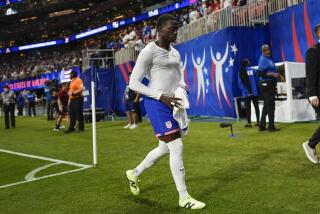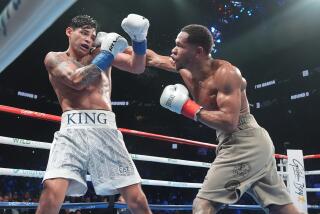WORLD CUP USA ’94 / THE FIRST ROUND : Maradona Finishes on a Positive : Argentina: Star player is suspended after test turns up five types of banned substances.
- Share via
IRVING, Tex. — Diego Armando Maradona, the pudgy Argentine soccer star, was suspended from the World Cup on Thursday, the day he would have set a record for most games played in tournament history.
In a sad ending to what had been a remarkable World Cup comeback, Maradona, 33, was withdrawn from the tournament by the Argentine Football Federation after testing positive for five types of banned substances under the umbrella name of ephedrine.
Ephedrine, commonly found in nasal sprays used for asthma, hay fever and congestion, has been used by athletes as a stimulant.
Wearing gray shorts and a sports shirt, a defiant Maradona emerged from his Dallas hotel room Thursday night to talk to reporters. With manager Marcos Franchi at his side, Maradona decried the decision to suspend him.
“FIFA has condemned me without giving me the chance to defend myself or explain myself,” he said in Spanish. “Machines can show many things, but I know I have done nothing wrong.
“FIFA is wrong if they think they can get away with this. I have my means to defend myself. . . . FIFA has taken away my happiness without listening to me.”
Maradona said he would not take a performance-enhancing substance because he worked so hard to prepare for World Cup ’94.
“This was supposed to be my World Cup,” he said, his eyes tearing. “That’s why I didn’t need anything to be in good shape.”
Maradona said he did not know if he would stay with the team or leave for Argentina. He refused to say what type of substance he took and why.
“I feel like I’m in an unreal time, an unreal place,” he said. “This just can’t be happening.”
Without him, Argentina lost for the first time in this year’s tournament, falling, 2-0, to Bulgaria at the Cotton Bowl in Dallas.
In the other Group D match, Nigeria defeated Greece, 2-0. Those results cost Argentina the Group D title, which went to Nigeria. Both Nigeria and Bulgaria improved their standing by scoring a goal in injury time. Argentina dropped to third.
All three teams advance to the second round.
The Argentine federation’s decision preempted any action by FIFA, soccer’s governing body, which will rule on Maradona’s case after the World Cup. FIFA officials could not outline the exact procedures but said the case would be handled by its disciplinary committee.
Maradona will be suspended until then.
“The decision they took was highly appropriate,” said Alan Rothenberg, president of World Cup USA ’94. “As a result, we can go back to the tournament.”
Julio Grondona, president of the Argentine federation, said officials met at the team hotel in Dallas early Thursday morning and made their decision. Waiting in the lobby after 2 a.m. were about 60 South American reporters.
The spectacle continued later in the morning at FIFA headquarters in Irving, where about 500 reporters swarmed the hotel as officials announced the outcome.
Argentina’s decision was happily greeted by FIFA officials, who had feared the case would escalate to the point that it overshadowed the competition.
Pablo Abbatangelo, federation secretary, told a Buenos Aires radio station the decision was reached “to avoid further sanctions that could compromise the team.”
As it stands, Argentina will not be penalized because only one player was involved.
“It’s a tough call whether it’s a violation for the team,” said Rothenberg, a member of the FIFA organizing committee that handled the affair.
Joseph Blatter, FIFA general secretary, said it is better to deal with the situation after the World Cup because of Maradona’s reputation and fame.
“The difficulties this player has had in (making) his way toward this World Cup (makes it) a human-moral problem, not only a doping problem,” he said.
Maradona was in the midst of a spectacular comeback after cocaine troubles had haunted him as recently as last year. He scored a goal in Argentina’s first Cup game against Greece and played a pivotal role in a 2-1 victory over Nigeria. In his fourth World Cup, he was to have played in a record-setting 22nd match Thursday night.
Maradona was banned from international competition for 15 months in 1991-92 for using cocaine, and trouble followed him from Italian professional leagues to Argentina, where in February of this year he fired pellets at reporters who camped outside his home when he went into seclusion.
When he began his World Cup comeback, he was so out of shape he could hardly keep up with his teammates, but he lost 26 pounds before the tournament and helped Argentina qualify in a playoff against Australia.
Maradona, although not the player he was when he led Argentina to the 1986 championship, still evoked fond memories for his legendary play.
FIFA President Joao Havelange of Brazil said Thursday’s outcome was a shock to the soccer world.
“It is with great sadness that we have to say that Maradona is suspended and will not play,” Havelange said. “I was always hoping that the result would be different. This was a very difficult decision for us, but the medical facts don’t lie.
“We personally feel for Maradona. He has been a great star for soccer.”
Maradona and teammate Sergio Vasquez were randomly selected to be tested for banned substances after Saturday’s game against Nigeria in Foxboro, Mass.
Analysts at the FIFA-accredited UCLA drug laboratory, handling all of the World Cup testing, found traces of the five types of ephedrine in Maradona’s system.
Ephedrine acts as a stimulant, increasing blood pressure and heartbeat, and is found in many over-the-counter medications.
“We did not find one single product on the market containing precisely these five products together,” Blatter said.
Don Catlin, director of the International Olympic Committee’s drug-testing facility at UCLA, said the substances can be found in an herb called Chinese ephedrine, which is marketed in health-food stores as a wake-up substitute for coffee.
Maradona’s was the first positive test during a World Cup since 1978 when Scotland’s Willie Johnston was sent home for taking an illegal substance.





